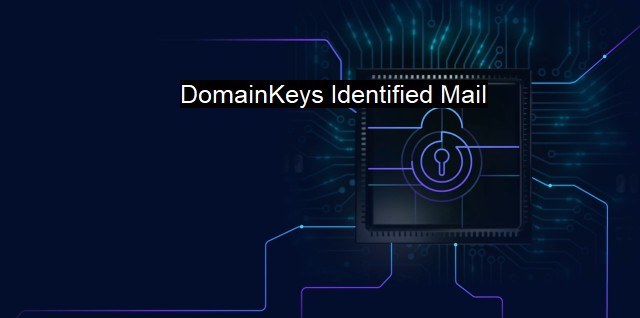What is DomainKeys Identified Mail?
Securing Your Inbox: Understanding the Importance and Functionality of DKIM Email Authentication Protocol in The Age of Cybercrime and Online Scams
DomainKeys Identified Mail, often abbreviated as DKIM, is an email authentication mechanism designed to prevent email spoofing, which is a common technique used in phishing and email spam. DKIM was developed keeping cybersecurity in mind and plays a critical role in making the internet safer and more secure by helping users verify the original sender.DKIM is a protocol that helps detect forgery and imitation of email addresses in a phishing attempt. It allows the receiver to check that the email claimed to be from a specific domain was indeed authorized by the domain's owner. DKIM achieves this by using "digital signatures" linked to the domain of the sender. When a domain sends an email, it generates a unique DKIM signature and attaches it to the mail header. This added layer of validation serves as a passport, aiding receivers in verifying that the email genuinely came from the indicated sender.
Especially concerning email communication, the importance of DKIM cannot be overstated. Cyber threats are increasingly leveraging email deception to spread malware and perform phishing attacks. One popular method involves disguising malicious email as legitimate by spoofing the "from" address. Combating this, DKIM enhances email security by verifying the domain that sent the email and verifying it hasn't been meddled with in transit.
When an email is sent, the DKIM system creates a unique string of characters, or a cryptographic hash, based on the content of the email. This hash is next encrypted with a private key, known only to the sender's system and added to the email's header. The receiving system uses the DNS system to retrieve the sender's public key and employs it to decode the hash in the email header. If the hash matches the content of the email, the receipt of the email is approved since it validates that the mail is indeed from the purported sender and hasn't been tampered with during transit.
A substantial advantage of the DKIM protocol lies in its ability to remain unaffected by the journey undergone by the email. Regardless of how many servers the electronic message passes through on its way to the recipient, the DKIM signature remains intact. Hence, it frees service providers from the risks associated with forging emails, providing considerable integrity to the notoriously vulnerable world of email communications.
Seeing a DKIM signature can enhance trust in an email recipient because it conveys the message that the domain owner is conscious about their email's security. It may even affect the placement of the sender's emails, as ISPs may filter email placements in inboxes or junk folders partly based on whether they are DKIM signed.
While DKIM is incredibly useful, it is most effective when synchronized with SPF and DMARC protocols because each covers different aspects of email communication and counteracting different types of cyberattacks. SPF checks if incoming mails originate from a domain that the receiver approves, while DMARC builds upon SPF and DKIM for fail-safe operations and comprehensive corporate control. Deploying these tools collectively creates a powerful line of defense, keeping networks secure, and promoting robust, trustworthy online correspondence.
The significance of DomainKeys Identified Mail as a cybersecurity tool is considerable. It serves as a protector against email spoofing, an ally in advancing the world towards secure, reliable email communication. By incorporating trusted technologies like DKIM, individuals and organizations are better equipped to tackle issues related to phishing, spam, and fraud, heightening the overall stance on cybersecurity.

DomainKeys Identified Mail FAQs
What is DomainKeys Identified Mail (DKIM)?
DKIM is an email authentication method that helps ensure that an email is sent by the owner of a domain, rather than a spammer or attacker. It adds a digital signature to the email header that can be verified against the public key published in the DNS records of the sender's domain.How does DKIM improve email security?
DKIM enhances the security of email communication by verifying the authenticity of the sender's domain and detecting email forgery attempts. It can prevent phishing and spoofing attacks, and help recipients trust the emails they receive.Do all email providers support DKIM?
Most major email providers support DKIM, including Google, Microsoft, Yahoo, AOL, and many others. However, some smaller or older email providers may not yet support DKIM.Do I need to set up DKIM for my own domain?
If you send emails from your own domain, you should consider setting up DKIM to improve email security and avoid being marked as spam. Most domain registrars and hosting providers offer DKIM setup as part of their services.| | A | | | B | | | C | | | D | | | E | | | F | | | G | | | H | | | I | | | J | | | K | | | L | | | M | |
| | N | | | O | | | P | | | Q | | | R | | | S | | | T | | | U | | | V | | | W | | | X | | | Y | | | Z | |
| | 1 | | | 2 | | | 3 | | | 4 | | | 7 | | | 8 | | |||||||